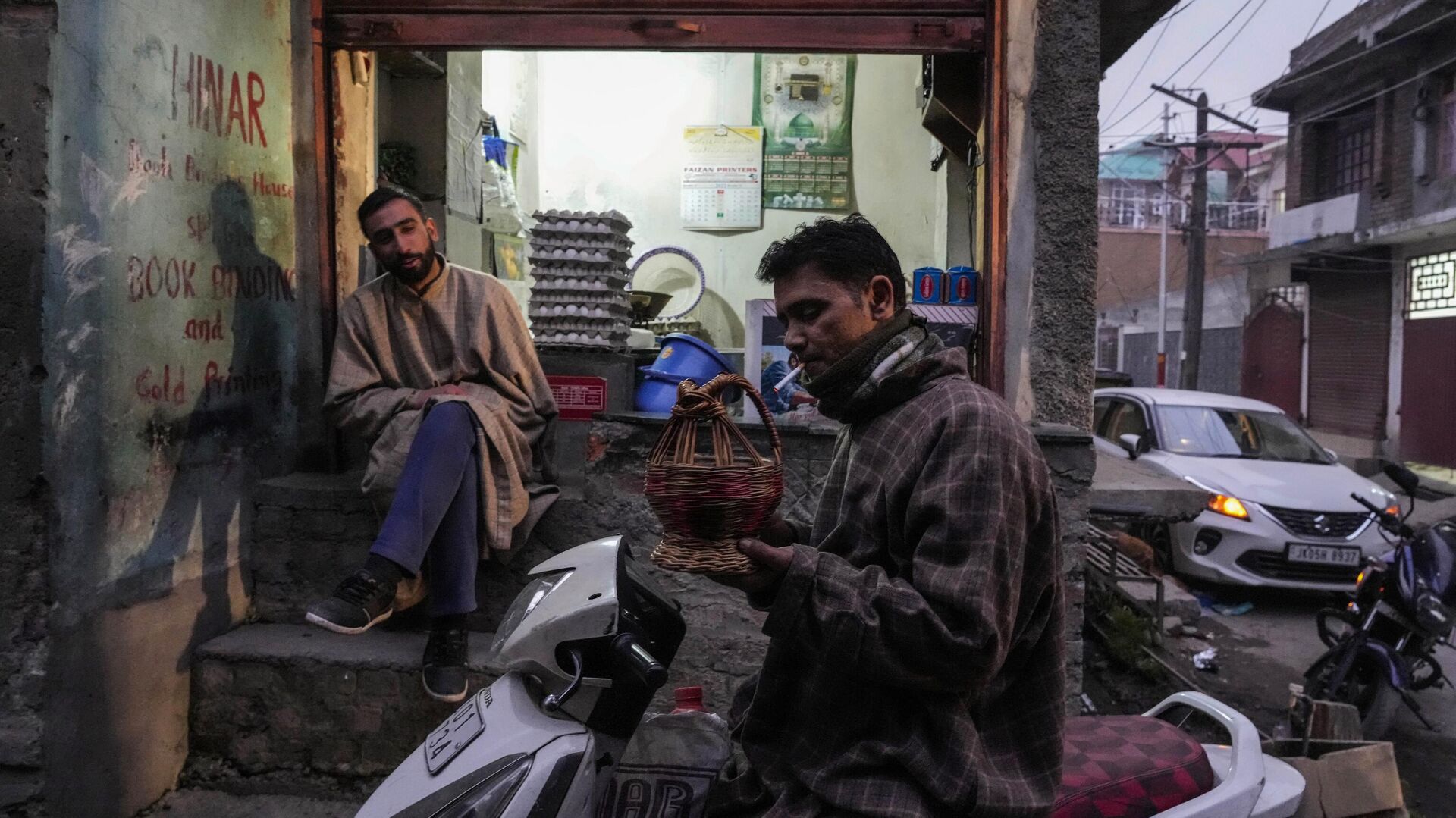https://sputniknews.in/20230117/what-is-the-land-row-in-jammu-and-kashmir-all-about-528646.html
What is the Land Row in Jammu and Kashmir All About?
What is the Land Row in Jammu and Kashmir All About?
Sputnik India
The Jammu and Kashmir administration is in the midst of a massive exercise to retake occupied state land, prompting local political parties to protest. 17.01.2023, Sputnik India
2023-01-17T18:47+0530
2023-01-17T18:47+0530
2023-01-17T18:47+0530
jammu and kashmir (j&k)
srinagar
india
land ownership
protests
https://cdn1.img.sputniknews.in/img/07e7/01/11/536284_0:161:3071:1888_1920x0_80_0_0_f9209ef7e07ec22a07d9c33fd6854d77.jpg
An official directive to evict anyone encroaching upon government-owned land in Jammu and Kashmir has caused political parties to express their anguish over the last week.As tensions continue to simmer throughout J&K, the matter was raised before India's top court, where a bench agreed to hear the matter following a petition filed in New Delhi against the land retrieval order.Meanwhile, Kashmiri politicians have threatened to launch a widescale agitation campaign if the government fails to reverse the order. The order comes at a time when Congress parliamentarian Rahul Gandhi plans to lead his foot march 'Bharat Jodo Yatra' into Srinagar, possibly raising further concerns about the amplification of the land retrieval order.What Lies Behind Today's Retaking of State LandThe legal framework to retake state land was established in August 2019 when Delhi revoked Jammu and Kashmir's semi-autonomous status, dividing the region into centrally governed union territories of Jammu and Kashmir, and Ladakh. The move brought an end to the erstwhile state's own constitution and laws, including those related to land ownership.Among the laws was also the Jammu and Kashmir State Land (Vesting of Ownership Rights to Occupants) Act, also known as the Roshni Act, enacted under the National Conference-led ex-state gov't in 2001, the act granted land ownership to people who had encroached on state land over the past several decades.Those people had to pay a certain amount of money for thier land, with which the local government wanted to raise funds for investments in the power sector and finance hydel-power projects. However, the act was blasted by some authorities.Since 2020, several executive orders sought to retrieve other state land deemed occupied by local residents who are not necessarily beneficiaries of the Roshni Act.The J&K government maintains that thousands of acres of state land are being occupied by local residents, including forest, commercial and residential land, on which shops, commercial establishments and houses have either been installed or are in the process of doing so.Similarly, the government plans to retrieve land given out on lease, especially to hotel owners.What Does the Latest Order Say?The central government had little control over decisions regarding the ownership and sale of land in Jammu and Kashmir before August 5, 2019. This was because only local residents could own land and legislation regarding land laws was the sole responsibility of an elected government in J&K.Last week, the Jammu and Kashmir government directed all the deputy commissioners to ensure the complete removal of encroachments from state land, including "Roshni land" by the end of January. Currently, senior government officials are in the midst of preparing to retrieve land promoting all major political parties to hit the streets to protest.
jammu and kashmir (j&k)
srinagar
india
Sputnik India
feedback.hindi@sputniknews.com
+74956456601
MIA „Rossiya Segodnya“
2023
Azaan Javaid
https://cdn1.img.sputniknews.in/img/07e6/0c/08/19280_0:0:1080:1080_100x100_80_0_0_d0f3f10ac6f30fb5b9e5e21a5e2536ea.jpg
Azaan Javaid
https://cdn1.img.sputniknews.in/img/07e6/0c/08/19280_0:0:1080:1080_100x100_80_0_0_d0f3f10ac6f30fb5b9e5e21a5e2536ea.jpg
News
en_IN
Sputnik India
feedback.hindi@sputniknews.com
+74956456601
MIA „Rossiya Segodnya“
Sputnik India
feedback.hindi@sputniknews.com
+74956456601
MIA „Rossiya Segodnya“
Azaan Javaid
https://cdn1.img.sputniknews.in/img/07e6/0c/08/19280_0:0:1080:1080_100x100_80_0_0_d0f3f10ac6f30fb5b9e5e21a5e2536ea.jpg
kashmir state land, revocation of kashmir semi autonomy, land ownership in kashmir, roshni act, kashmir protest, kashmiri parties,
kashmir state land, revocation of kashmir semi autonomy, land ownership in kashmir, roshni act, kashmir protest, kashmiri parties,
What is the Land Row in Jammu and Kashmir All About?
The Jammu and Kashmir administration is in the midst of a massive exercise to retake occupied state land, prompting local political parties to protest.
An official directive to evict anyone encroaching upon government-owned land in Jammu and Kashmir has caused political parties to express their anguish over the last week.
As tensions continue to simmer throughout J&K, the matter was raised before India's top court, where a bench agreed to hear the matter following a petition filed in New Delhi against the land retrieval order.
Meanwhile, Kashmiri politicians have threatened to launch a widescale agitation campaign if the government fails to reverse the order.
The order comes at a time when Congress parliamentarian Rahul Gandhi plans to
lead his foot march '
Bharat Jodo Yatra' into Srinagar, possibly raising further concerns about the amplification of the land retrieval order.
What Lies Behind Today's Retaking of State Land
The legal framework to retake state land was established in August 2019 when Delhi revoked Jammu and Kashmir's semi-autonomous status, dividing the region into centrally governed union territories of Jammu and Kashmir, and Ladakh. The move brought an end to the erstwhile state's own constitution and laws, including those related to land ownership.
Among the laws was also the Jammu and Kashmir State Land (Vesting of Ownership Rights to Occupants) Act, also known as the Roshni Act, enacted under the National Conference-led ex-state gov't in 2001, the act granted land ownership to people who had encroached on state land over the past several decades.
Those people had to pay a certain amount of money for thier land, with which the local government wanted to raise funds for investments in the power sector and finance hydel-power projects.
However, the act was blasted by some authorities.
Thousands of people in Jammu and Kashmir were described as beneficiaries of the "scam". The act was termed “illegal” in a Jammu and Kashmir High Court in 2020 and the government passed orders to start the process of land recuperation.
Since 2020, several executive orders sought to retrieve other state land deemed occupied by local residents who are not necessarily beneficiaries of the Roshni Act.
The J&K government maintains that thousands of acres of state land are being occupied by local residents, including forest, commercial and residential land, on which shops, commercial establishments and houses have either been installed or are in the process of doing so.
Similarly, the government plans to retrieve land given out on lease, especially to hotel owners.
What Does the Latest Order Say?
The central government had little control over decisions regarding the ownership and sale of land in Jammu and Kashmir before August 5, 2019.
This was because only local residents could own land and legislation regarding land laws was the sole responsibility of an elected government in J&K.
Last week, the Jammu and Kashmir government directed all the deputy commissioners to ensure the complete removal of encroachments from state land, including "Roshni land" by the end of January.
Currently, senior government officials are in the midst of preparing to retrieve land promoting all major political parties to hit the streets to protest.


